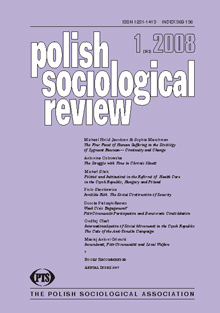Weak Civic Engagement? Post-Communist Participation and Democratic Consolidation
Weak Civic Engagement? Post-Communist Participation and Democratic Consolidation
Author(s): Dorota Pietrzyk-ReevesSubject(s): Social Sciences
Published by: Polskie Towarzystwo Socjologiczne
Keywords: civic engagement; civic sphere; democratization; democratic consolidation; post-communist societies
Summary/Abstract: The aim of this article is to analyze the problem of civic and political participation in the postcommunist context from the perspective of contemporary democratic theory, the concept of democratic consolidation, and the thesis of the "weakness of civil society in post-communist countries." It argues that the institutional approach to democratization and participation does not provide a full answer to the question of how democratic systems become consolidated and thus it needs to be supplemented by the cultural approach. The analysis of the patterns of democratic participation in post-communist countries, however, is further complicated by their background conditions, the burden of the communist past, and the model of democratization that they have undergone. Although it seems that a participatory, civil-society centred type of democratic politics would revitalize and strengthen democracy in post-communist countries, two questions-addressed in this article-arise. First, whether contemporary democratic theories shed enough light on the processes involved when it comes to a democratic change and democratic consolidation in the post-communist context, and second, whether a weak civic sphere is a major impediment to the development of a truly democratic system.
Journal: Polish Sociological Review
- Issue Year: 161/2008
- Issue No: 1
- Page Range: 73-87
- Page Count: 14
- Language: English

